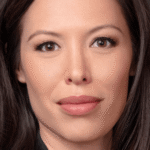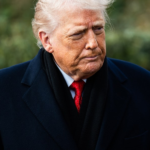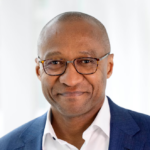Prince Mohammed warmly greeted Trump as he stepped off Air Force One and kicked off his Middle East tour.
The two leaders then retreated to a grand hall at the Riyadh airport, where Trump and his aides were served traditional Arabic coffee by waiting attendants wearing ceremonial gun-belts.
The pomp began before Trump even landed. Royal Saudi Air Force F-15s provided an honorary escort for Air Force One as it approached the kingdom’s capital.
“When Saudis and Americans join forces, very good things happen — more often than not, great things happen,” Saudi Investment Minister Khalid al-Falih said.
But Saudi Arabia’s economy remains heavily dependent on oil, and the kingdom needs a fiscal break-even oil price of $96 to $98 a barrel to balance its budget. It’s questionable how long OPEC+, of which Saudi Arabia is the leading member, is willing to keep production elevated. The price of a barrel of Brent crude closed Monday at $64.77.
“One of the challenges for the Gulf states of lower oil prices is it doesn’t necessarily imperil economic diversification programs, but it certainly makes them harder,” said Jon Alterman, a senior Middle East analyst at the Center for Strategic and International Studies in Washington.
The three countries on the president’s itinerary — Saudi Arabia, Qatar and the United Arab Emirates — are all places where the Trump Organization, run by Trump’s two elder sons, is developing major real estate projects. They include a high-rise tower in Jeddah, a luxury hotel in Dubai and a golf course and villa complex in Qatar.
But Trump arrived in the Mideast at a moment when his top regional allies, Israel and Saudi Arabia, are far from neatly aligned with his approach.
The administration didn’t notify Israel — which the Houthis continue to target — of the agreement before Trump publicly announced it. It was the latest example of Trump leaving the Israelis in the dark about his administration’s negotiations with common adversaries.
“Israel will defend itself by itself,” Netanyahu said last week following Trump’s Houthi truce announcement. “If others join us — our American friends — all the better.”
William Wechsler, senior director of the Rafik Hariri Center and Middle East Programs at the Atlantic Council, said Trump’s decision to skip Israel on his first Middle East visit is remarkable.
“The main message coming out of this, at least as the itinerary stands today, is that the governments of the Gulf … are in fact stronger friends to President Trump than the current government of Israel at this moment,” Wechsler said.
Trump, meanwhile, hopes to restart his first-term effort to normalize relations between the Middle East’s major powers, Israel and Saudi Arabia. Trump’s Abraham Accords effort led to Sudan, the UAE, Bahrain and Morocco agreeing to normalize relations with Israel.
But Riyadh has made clear that in exchange for normalization it wants U.S. security guarantees, assistance with the kingdom’s nuclear program and progress on a pathway to Palestinian statehood. There seems to be scant hope for making headway on a Palestinian state with the Israel-Hamas war raging and the Israelis threatening to flatten and occupy Gaza.
Prince Mohammed last week notably hosted Palestinian Vice President Hussein Sheikh in Jeddah on the sheikh’s first foreign visit since assuming office in April.
Hussain Abdul-Hussain, a research fellow at the Foundation for Defense of Democracies, said the crown prince appeared to be subtly signaling to Trump that the kingdom needs to see progress on Palestinian statehood for the Saudis to begin seriously moving on a normalization deal with the Israelis.
“Knowing how the Saudis telegraph their intentions, that’s a preemptive, ‘Don’t even think of asking us to show any goodwill toward normalization,’” Abdul-Hussain said.









